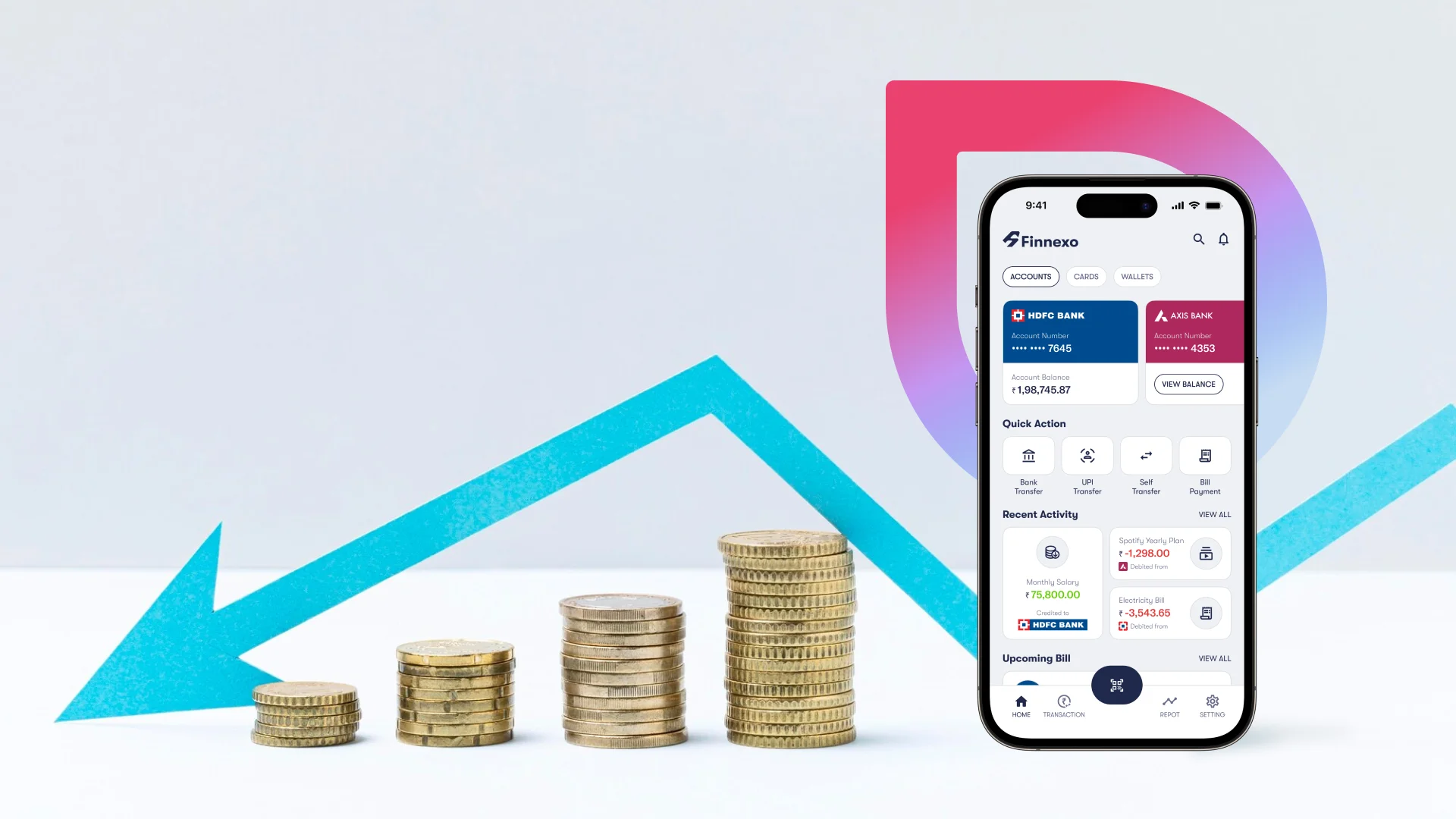How to Reduce Mobile App Development Cost?
- Mobile
- January 20, 2024
In this blog, we delve into practical strategies to reduce app development costs without compromising on quality. From efficient project planning to leveraging reusable components and outsourcing non-core tasks, we explore actionable steps to optimize your budget while delivering a stellar app that meets user needs.
In the wave of digital transformation, apps have taken upon the business market by offering users convenient ways to access services from different domains. No doubt why the revenue of the app market is marked to reach $673.80bn by 2027, at a CAGR of 8.83%.
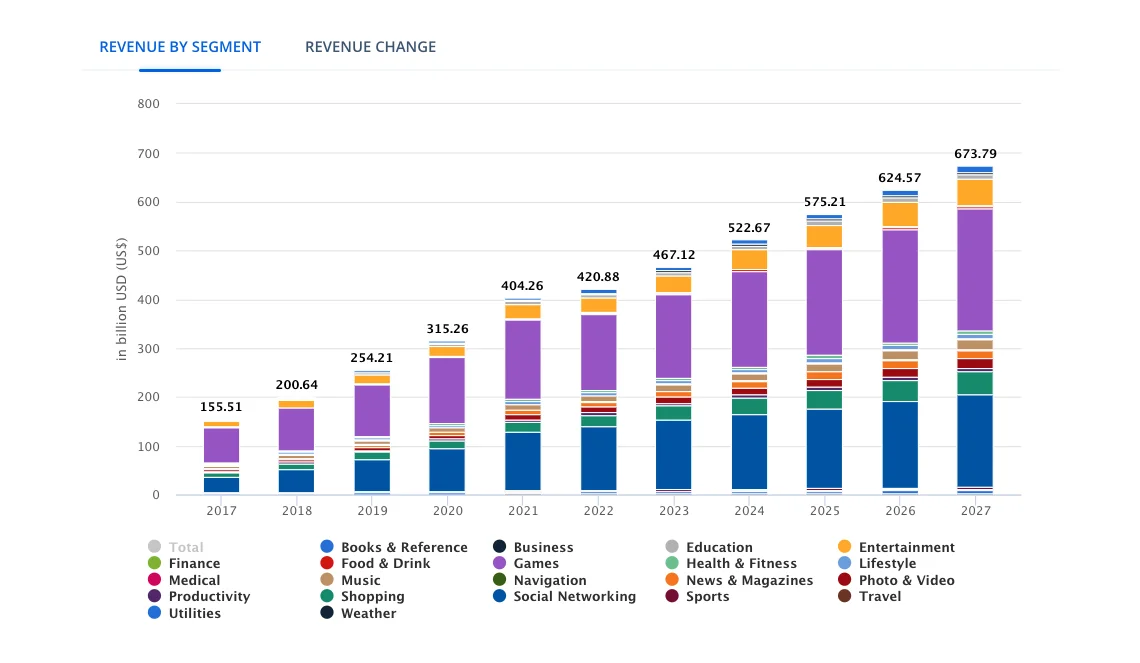
This graph clearly shows the opportunities the mentioned industries can grab onto to take their business further by creating user-friendly apps. Even our research on mobile app usage and growth statistics also witnesses that.
However, developing apps that modern users want can be cost-intensive.
Most of the time, not from the complexity side, but poor project management is also responsible for an increase in the cost of the app development. Many times, businesses fail to plan things ahead and explore curiosity to explore steps to follow to bring their app concept to life.
It’s extremely important to have a blueprint for the app development project because it helps in controlling the evolution and thus reducing the costs.
In our 13+ years of experience being an ideal mobile application development company, we rarely have seen clients breaking the bank to develop their apps. Consolidating our experience in this domain with expert project management and technical analysis, we came up with strategies that have helped us deliver our client’s app development services considering their budget.
So, explore our top tricks and tips to reduce app development costs that will benefit you.
What are The Factors Affecting The Cost of App Development
If you plan to calculate the mobile app development cost of your concept, you’ll find several factors directly proportional to such a project. Some of the popular app development cost affecting factors may include:
- App Complexity: The more number of and advanced features you want to add to your app the more development time and resources will be required.
- App Platform Choice: Opting for native or cross-platform app development can make a difference in terms of app development time and cost.
- Design Requirement: Custom designs and advanced animation has more influence on the cost than a set of pre-designed screens.
- Engagement Model You Choose: Whether choosing fixed cost, dedicated hiring, or anything else, each engagement model is designed to meet a certain level of requirements. Based on this selection, the cost can also vary.
- Development Team Location: Are you outsourcing your project or exploring the benefits of hiring offshore app developers from other locations like India? Well, the regions you choose your talents from also affect the cost.
- Expertise: Looking for entry-level, intermediate, or experts to work on your project? Each skill range comes at a cost.
- Technology: AI/ML-powered app development can cost more than one with a basic technology stack.
- Integration with Third-party Services: The more external services you want to offer through your app to offer conveniences to your users, the more subscription fees and integration costs will add up to your invoice.
- Maintenance and Support: Ongoing updates, bug fixes, and user support require additional budget allocation.
- Testing and Quality Assurance: Comprehensive testing for bugs, performance, and security can be resource-intensive.
Project Management: Effective management and coordination of the development process are crucial, impacting overall costs.
Hidden Cost of Developing A Mobile App
We all know the core factors associated with app development. While the initial cost of developing a mobile app may seem straightforward, there are often hidden expenses that can significantly impact the overall budget. As an app development project progresses, various factors can contribute to unexpected costs, potentially influencing the project timeline and budget if not properly managed.
Just like your credit card bill, your app development project is also prone to hidden costs. Yes, you heard it right! To avoid these hidden costs, it’s crucial for app development teams to carefully plan and account for potential expenses throughout the development lifecycle.
You can refer to and anticipate the below-mentioned causes influencing app development hidden costs to ensure that your project stays on track and within budget:
1. Third Party API & Services Integration
If building a feature-rich app, it could have the need to be integrated with the third-party services or APIs for online payment, booking, etc. However, these may come up with licensing fees, usage fees, and customization requirements. Therefore, you must not overlook the costs associated with third-party API integrations.
2. Ongoing Maintenance and Support
The app is a part of your digital presence. It must perform well all the time and offer users a world-class app experience. This asks for investment in the ongoing maintenance and support of your app. Failing to budget for these ongoing expenses can lead to significant costs down the line.
3. Testing and Quality Assurance
Thorough app QA testing process is a must when developing your dream app to ensure app stability and performance. Though it may seem like contributing a small part to the app development, it essentially plays a crucial role. Underestimating the time and resources required for thorough testing can result in costly bugs and rework.
4. Legal and Compliances
Adhering to app store guidelines, industry standards, data privacy regulations, and many other legal considerations for the app may contribute to the app development cost, which is often underestimated by many.
5. User Acquisition and App Marketing
The work doesn’t just end with app development and publishing, you do have to consider investing in-app marketing, spreading awareness about the app, and influencing the audience to use your app. So, at the time of budgeting your app development project, you should definitely not overlook these user acquisition and app marketing considerations.
Now, as you have learned about both app development cost-affecting factors and hidden/overlooked factors, you should now focus on strategies to reduce app development costs.
How To Reduce Mobile App Development Cost?
In mobile app development, you have options to explore multiple routes, which can be traditional full-cycle app development or another can be time and cost-saving MVP development. When it comes to getting the idea validated in less time with minimal investment, our favorite one is MVP development.
But that’s not the only contributor to low-cost app development, you may have to consider others as well, which are as follows:
1. Set Up SMART Goals for Your App
You should have a clear vision about the kind of app you want to create, features and functionalities it should have, future scaling plans somewhat, and more. Not having clarity about your app can make you lost in suggestions of what to include and what not, leading to high app development costs.
Hence, it asks for proper ideation and discovery about your app idea, which requires specific skills like Business Analysts, Project Managers, and Technical Architects. They help you see your idea from both a technical and business perspective to help you get clarity on whether it’s worth the investment or not.
Now, explore what does these SMART goals tend to:
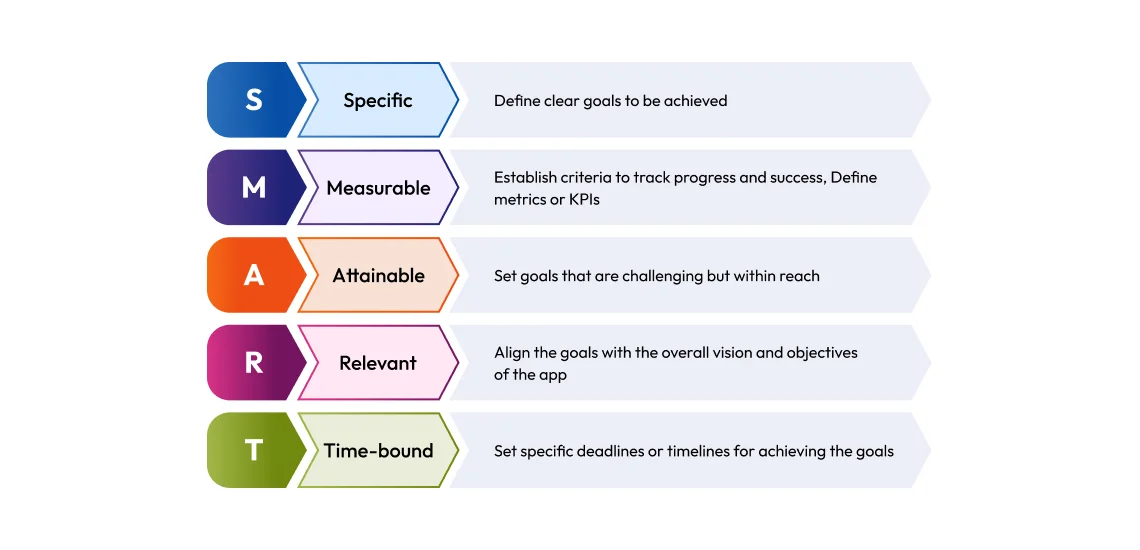
The goals you set for your mobile app development project should keep you informed from start to finish.
These SMART goals should be the basis for your app development project with intricate details like:
- App Development Scope
- Project Roadmap
- Project Timeline with Buffer
This will not only keep you on track but also on budget. Hence, it’s necessary to have SMART goals planned.
Pro Tips:
- Engage key stakeholders, including developers, designers, project managers, and clients, in the goal-setting process to ensure buy-in and alignment.
- Focus on high-priority goals first to ensure that the most critical aspects are addressed early.
- Be prepared to review and adjust goals as the project progresses and new information becomes available.
- Clearly outline what success looks like for each goal.
- Plan for potential resource constraints and develop contingency plans.
2. Choose Cross-platform Over Native App Development
Due to various reasons, many startups prefer Cross-platform app development. The popular reason includes developing robust apps with less effort and investment than native app development.
As per our experience working in this industry and developing more than 200 apps using Flutter and React Native, we can say cross-platform app development can help to save project costs up to 30-40%.
The reason behind this is that your app would have a single codebase for both Android and iOS. This contributes to the app development time reduction, leading to cost savings.
Reasons to choose Cross-platform app development:
- Lower maintenance costs
- Code reusability
- Faster time to market
- Consistent user interface across platforms
With perks like cost-effectiveness and faster build, it also has its limitations, like:
- Not that performant as native apps
- May have limitations in making some platform-specific functionalities available
- Delays in catching up with updates
However, opting for cross-platform still worth the try as the community is also working on improving cross-platform app development frameworks and technologies.
Pro Tips:
- Assess your app complexity
- Check for limitations of each cross-platform technology
- Estimate efforts to be taken for the app development and skills required
- Do cost analysis and then choose the right cross-platform between Flutter or React Native.
3. Hire Top App Developers From Global Talent Pool at Competitive Rates
Many industry experts agree that around 80% of the app development cost goes to the salary of talents working on it. This asks for giving serious attention to talent factors to save up your app development cost.
Plus, each region has its own standard of cost for services and talents they are delivering for a dedicated model. It’s just a matter of finding the right talent pool at a cost that fits well into your budget.
If you check, you may find hiring dedicated app developers from Europe, the United States, etc., costlier than hiring ones from Asian countries, especially India.
Here, you’ll not just find the top talents that are skilled, but also their hiring charges are low as compared to other countries.
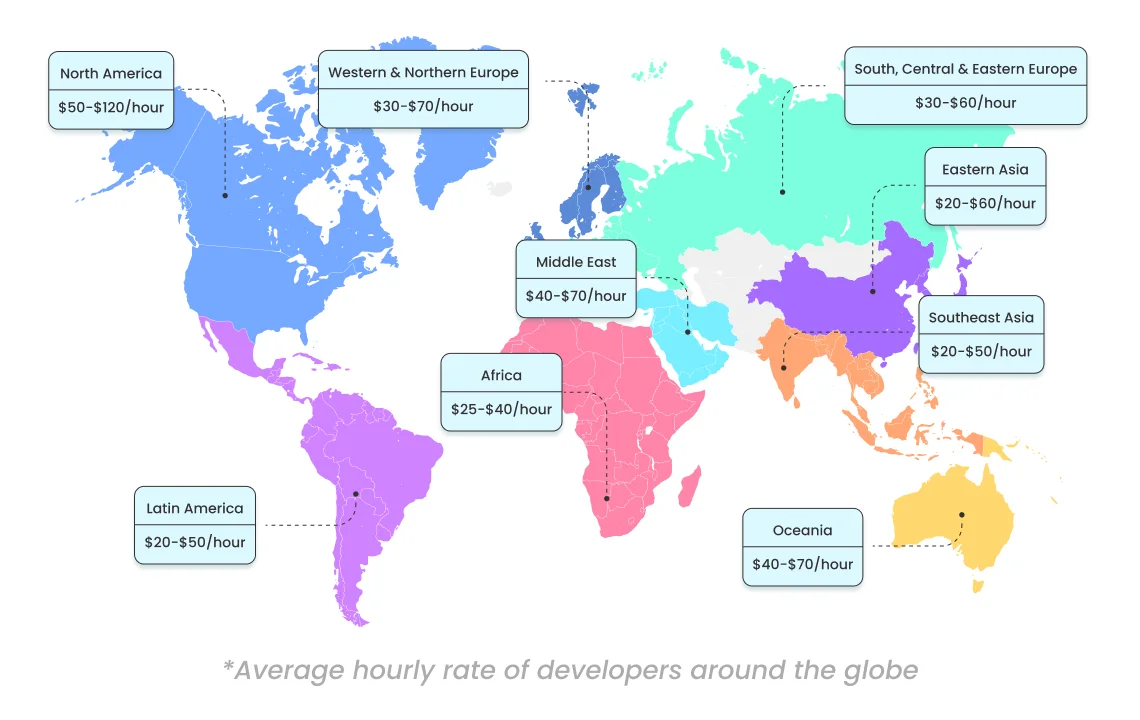
When you can hire dedicated mobile app developers from India at $20 – $50+, why go for other countries? And that’s the beauty of dedicated remote hiring.
Pro Tips:
- Match the developer’s expertise to your project’s needs.
- Consider factors like programming languages, frameworks, and experience with similar apps.
- Look for time zone compatibility
- Review the developer’s past projects and ask for references

4. Don’t Limit Your Inquiry To One App Development Company
That’s great if you feel that the first app development services provider company is your ideal one. However, it’s advisable to look for other references. Who knows, you may find a service provider that not only offers better talents but also top-notch app development services under your budget.
Pro Tips:
- Explore top app development companies in specific countries
- Check their portfolio, shortlist, and reach out
- Get a quote for your app development project and choose the best one
Keep exploring service providers until you find an ideal mobile app development partner.
5. Focus on MVP Benefits
When you have a unique app idea it’s best to prioritize MVP development that not only helps you test the effectiveness of your idea but also in cost saving. How so?
MVP app development is all about building a basic version of your app with just enough features to satisfy early users and gather feedback. With this, you test your app idea, gather valuable insights, and make improvements based on real user experiences.
In fact, MVP development is the most effective way to introduce your app to the market quickly in a less investment.
On average, MVP development cost can start from $5,000 and reach up to $10,000, depending on the app concept complexity.
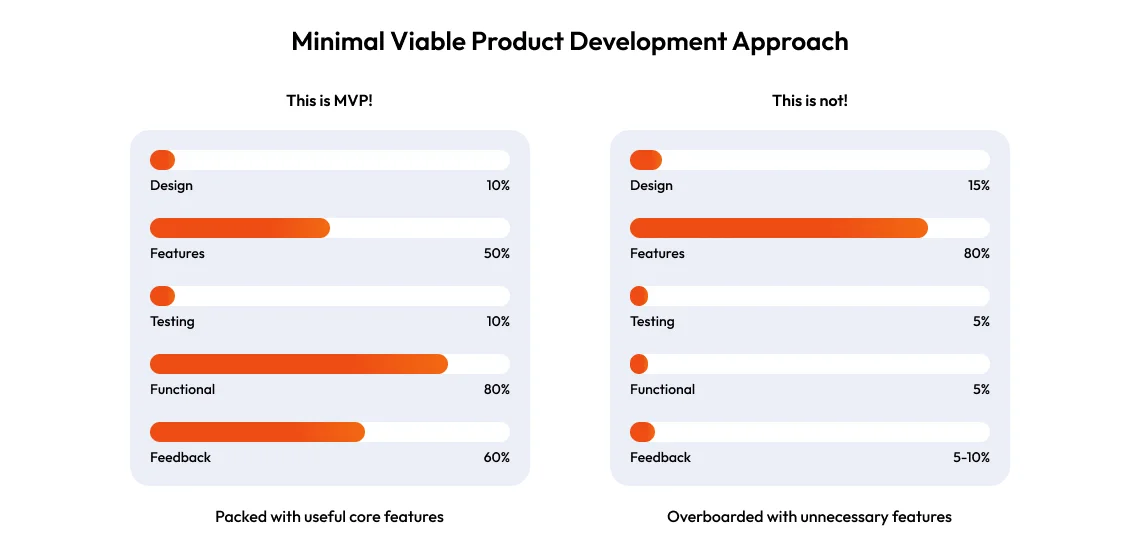
Pro Tips:
- Identify the essential features that solve the core problem
- Be open to pivoting or making changes based on user feedback and market trends
- Design the MVP architecture with scalability in mind
In short, there are numerous benefits associated with MVP development.
6. Leverage Open-source Digital Services
When planning to reduce the cost of an app development project, open-source comes at best a rescue plan. We are not just saying this to make that up. It also has validation from industry experts.
By leveraging open-source tools, app development costs can be significantly reduced, potentially leading to savings of up to 30% to 50% or more, depending on the project’s scale and requirements. App development cost savings can also go up to 55%, as backed by the Linux Foundation.
You can decide to integrate your app with the following open-source services:
- Firebase: A comprehensive app development platform that provides open-source SDKs and APIs for features like authentication, real-time database, hosting, cloud functions, and more.
- Sentry: An open-source error-tracking tool that helps developers monitor and fix crashes in real time.
- Amplitude: An open-source analytics platform that helps developers track user behavior and engagement within their apps.
- Bugsnag: An open-source error monitoring platform that helps developers detect, diagnose, and fix errors in their apps.
Well, you’ll find many open-source services that can help you build your dream app at a reduced cost than usual.
Pro Tips:
- Evaluate the features offered by open-source services and contingencies
- Opt for open-source services with active and supportive communities
- Choose open-source services that offer seamless integration with other technologies and platforms
- Ensure that tools you’re considering are scalable
- Ensure that the open-source tools you select have robust security features.
7. Harness the Power of Agile Approach
Whether you ask for time or money, both lead to the same way. Targeting both assets with a single shot can be done by leveraging the agile approach in app development. Many experts agree that agile methodology for app development not only saves time but also contributes significantly to app development cost savings.
Perks of agile methodologies include:
- Iterative development process for continuous refinement and improvement
- Flexibility and adaptability for the team to respond quickly to changing project requirements
- Prioritizing features based on business value and user needs
- Focus on delivering working software in short iterations reduces the overhead associated with traditional project management methodologies.
- Testing the app during the development stage to avoid more costs associated with fixing defects and bugs later in the development cycle.
Pro Tips:
- Break down the app development process into smaller iterations or sprints, focusing on delivering incremental value while discovering and addressing issues early, reducing rework and associated costs.
- Involve continuous feedback loops with app stakeholders and end-users to ensure that development is going as planned, minimizing rework and additional costs.
- Set clear timeframes for each iteration or sprint to ensure timely delivery of features.
How MindInventory Can Be Your Ideal App Development Destination
As you can see, cutting back on the mobile app development costs is not such a hard task. By doing some simple things, such as giving feedback, smartly dividing the tasks, and removing the non-essential features and design elements, you will see that there is a lot of time and money that can be saved with proper planning.
When you want to save up your time associated with app development from the discovery to final product development, MindInventory could be your ideal mobile app development company. From Y-combinator-backed startups to Fortune 500 businesses, we have been their preferred choice for their app development projects.Have a project in mind? Share with us today!
FAQs on Mobile App Development
When developing an app, you need to consider the target audience, platform selection, features and functionalities, user experience, app performance and speed, app security, testing and quality assurance, feedback and integration, monetization strategy, and most importantly app maintenance and updates.
As a general guideline, developing a simple app can take anywhere from 2-6 months, while more complex apps can take 6-12 months or longer. The timeline for the app development can depend on factors such as the complexity of the app idea, platform, team size and expertise, and development methodology.
A good mobile app is user-friendly, offering intuitive navigation and a seamless user experience. It performs efficiently, with fast load times and minimal crashes. The app provides value through useful features and relevant content, and it maintains strong security to protect user data.
